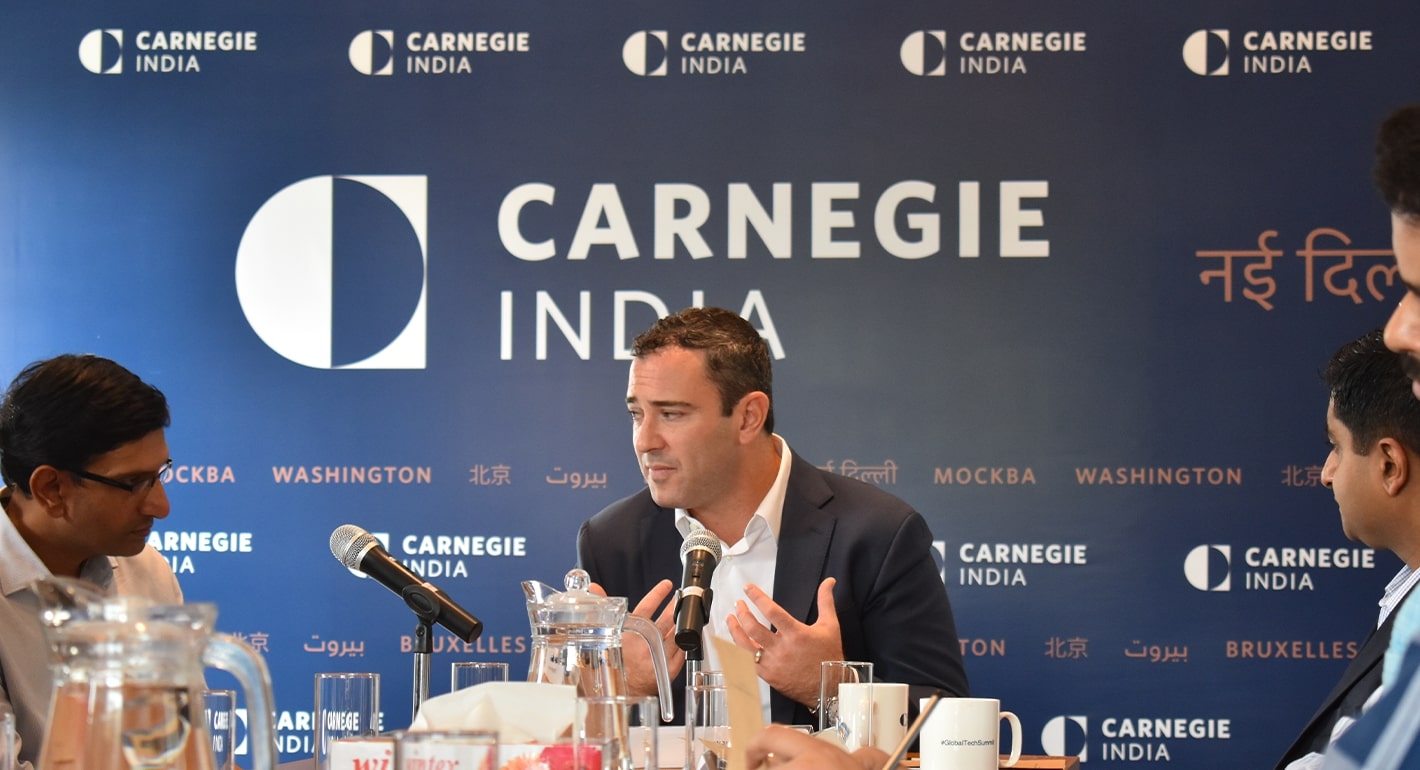Registration
You will receive an email confirming your registration.
The United States and China have been unable and unwilling to find a resolution to the so-called trade war between them. What is increasingly apparent is that the imposition of reciprocal tariffs on goods is a symptom of a larger structural shift in Sino-U.S. relations. Where is the ‘trade war’ heading? What would a resolution, if any, look like in the near future? Is there a structural or geo-strategic shift in the way in which the U.S. administration currently seeks to deal with China, which will outlive both Donald Trump and Xi Jinping? Could India benefit from the current impasse?
Carnegie India hosted a roundtable discussion with Tom Wyler, senior vice president for global strategy and business development at PSP Partners, to answer these questions, and more. The discussion was moderated by Senior Fellow Srinath Raghavan.
DISCUSSION HIGHLIGHTS
- State of Play: Participants explained that the possibility of a trade war with China was first floated during Donald Trump’s Presidential campaign in 2016, but it was only in August 2019 that there was a seismic escalation regarding this rhetoric. Participants noted that in early August, the Trump administration announced new tariffs on China in two different stages, to be implemented in September and December, on over 300 billion USD worth of Chinese goods. In response, China issued retaliatorily tariffs on U.S. imports. Participants noted that this has given rise to renewed U.S. efforts to further increase the tariff rates on Chinese products. Additionally, participants highlighted, President Trump’s hostile attitude towards the Chinese leadership and companies have further exacerbated the current tensions between the two nations. Participants acknowledged that while consumers have not felt the brunt of the trade war yet, the effects of the new taxes will soon be apparent closer to the end of the year.
- U.S. Motivations: Participants discussed the underlying reasons because of which the United States initiated the trade war. First, they noted a growing American concern about Chinese economic behavior over the last twenty five years. Second, they highlighted the large tectonic shift in supply chains which have impacted the global economy. Participants stated that some actors in the United States viewed this economic shift as threatening America’s position as the predominant global power. Participants observed that the U.S. and Chinese economic models are polar opposites; China uses economics to meet political ends, whereas the United States uses political means for economic ends. The two models are therefore incompatible with each other, they underlined. Participants also deliberated on the various strategies employed by the Trump administration to tackle the impact of the trade war. Some participants also discussed the possibility of striking a deal between the United States and China, while others noted that a deal seems highly unlikely given the current geopolitical landscape.
- Next Steps: Participants examined the future course of the trade war and the possibility of reaching a short-term interim agreement. Participants noted that while the idea of the United States decoupling from China seems attractive to a certain voter base, it actually poses a risk to the U.S. economy. Participants emphasized the importance of establishing a constructive dialogue between the two nations as well as leveraging advice from Chinese experts to deescalate the current situation through a comprehensive strategy.
- Role of external actors: Given the interconnected and interdependent global economic framework, the U.S.-China trade war has the potential to impact other economic markets. Some participants suggested that emerging economies, like India, should leverage this as an opportunity to augment their role in the global economy. However, other participants stated that the complex manufacturing and export system that China has perfected over the years will be difficult for other economies to replicate. Participants expressed that while there is a renewed focus on regional economic partnerships, like the RCEP, the U.S.-China trade war will have far reaching global implications.
This event summary was prepared by Rhea Menon, a senior communications coordinator and research assistant at Carnegie India, with inputs from Prateek Jha, a research assistant Carnegie India.
Tom Wyler
Tom Wyler is senior vice president for global strategy and business development at PSP Partners. In that role, he works across PSP’s deal teams and portfolio companies to identify investment opportunities and develop long-term growth strategies in markets around the world. Previously, Wyler served in the Obama administration as counselor to the secretary and senior advisor for international economics at the U.S. Department of Commerce. He helped lead the Commerce Department’s policy engagement with the White House and other government agencies on a wide range of international economic and trade matters, including U.S.-China economic relations, the Trans-Pacific Partnership, and the administration’s long-term strategic planning initiative.
Rudra Chaudhuri
Rudra Chaudhuri is the director of Carnegie India. His primary research interests include the diplomatic history of South Asia and contemporary security issues.
